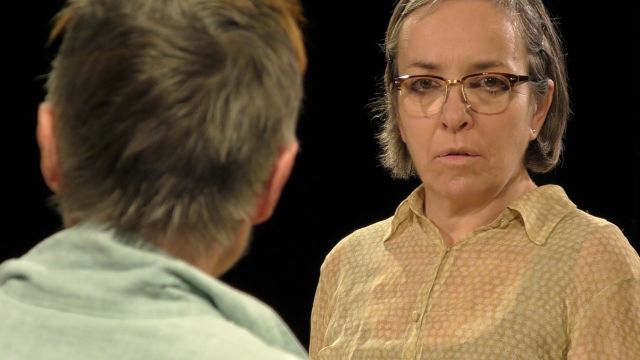Frailty
‘Frailty, thy name is woman,’ says Hamlet. He’s fulminating about his oh-so-recently widowed mother’s o’er hasty marriage to his uncle Claudius. She’s weak, he thinks; she gave in to Claudius and to base, rank desires – which, really, she is too old to feel… Really?
Such is the ostensible topic that brings together Barb (Bev Geldard) and Annie (Bridget Haylock), mismatched, middle-aged women doing an assignment for some adult education thing. ‘“Frailty, thy name is woman”: discuss.’
So, Annie comes around to Barb’s place and Barb is dreading it. ‘Why did they put me with her?’ she wonders. ‘She looks like a nun.’ Barb’s a bit of a rough head, but an autodidact who left school early, now she’s given up the smokes, still likes a drink and swears when provoked, which is easy and often. Annie arrives – tentative, trepidatious, stitched-up in her cardie and old-fashioned hair – and she’s brought her own herbal teas. God help us! The contrast between the two is nicely judged by Sue Ingleton and she could so easily have relied on that for more laughs. She doesn’t; she goes further because she has other things to say.
 After a bit of awkward and off-topic chat, Barb and Annie get on with their assignment… If that’s all there was to it, there wouldn’t be much of a play. But let’s says that this pair don’t go at it like a couple of blokes would. They connect quickly in the uncompetitive but curious way that women can. They put aside their differences - and any reverence for the Bard - to mine the text with insight, sensitivity, inspired insight and the anger that arises from their life experiences.
After a bit of awkward and off-topic chat, Barb and Annie get on with their assignment… If that’s all there was to it, there wouldn’t be much of a play. But let’s says that this pair don’t go at it like a couple of blokes would. They connect quickly in the uncompetitive but curious way that women can. They put aside their differences - and any reverence for the Bard - to mine the text with insight, sensitivity, inspired insight and the anger that arises from their life experiences.
So, there’s a growing, tolerant acceptance of each other, the barriers fall away, and they divert into more personal revelations. Annie is still married (so not a nun) and has three children. Barb tosses off lightly that her sons ignore her and her daughter hates her. These revelations are not incidental: they are central, weaving in and out of their discussion of Shakespeare’s play. Barb’s really put the work in and seems the more driven, but her past wound still aches, while Annie, who listens admiringly (as a defence?), has rationalised hers.
And there’s another woman in Hamlet, Ophelia. What about her? Did she ever get done! Barb reckons Hamlet seduced her, then dumped her and that she was pregnant when she drowned. What? How come no one’s seen that before? Well, it’s Shakespeare… But Barb can back it up. The two of them get excited. The progression and process of reaching the point where inhibitions and discretion are thrown aside are entirely convincing, a natural development from their more ‘academic’ pursuit. Confessions are made and tears are shed, but don’t think things get sentimental. The past remains present and unhealed.
Frailty is a heartfelt but not heavy-handed chamber piece, an interaction between two different but convincing women beautifully realised by Ms Geldard and Ms Haylock and beautifully written and directed by Ms Ingleton. This is a product of independent and – in this case – unsupported theatre. It should be a showcase for the writer – a distinguished theatre veteran - and could well be a party piece for these fine actresses.

Who knew a close reading of Hamlet could give rise to engrossing, entertaining, funny and, finally, very moving theatre? Ms Ingleton tells us that the play will soon go on tour. Look out for it.
Michael Brindley
(By the way, D H Lawrence fulminated against Hamlet too, ‘a creeping, unclean thing he seems.... His nasty poking and sniffing at his mother… his conceited perversion with Ophelia make him always intolerable.’ (Twilight in Italy’, Chapter 3.) I also remember an Eng Lit lecture at Sydney University by the now Booker Prize winning novelist Howard Jacobson in which he asked, what is Hamlet’s problem? All Gertrude wants to do is hang out with the boys – and she dies with a drink in her hand.)
Subscribe to our E-Newsletter, buy our latest print edition or find a Performing Arts book at Book Nook.

